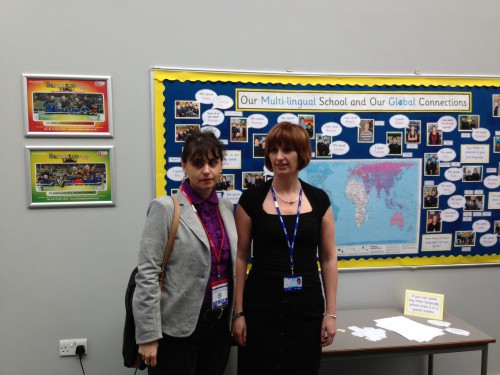2nd April 2013
Roma Inclusion in Rotherham and Romania
Last month I was in Rotherham in South Yorkshire with a delegation from Dolj County looking at approaches to Roma inclusion.
This was the return visit after the leader of Rotherham Municipal Borough Council Roger Stone OBE visited Craiova and Podari last January. I wanted him to see the excellent work that local authorities have been doing on Roma inclusion in partnership with Ovidiu Ro, and to start a conversation on Roma inclusion between local authorities in Romania and the UK which are both trying to address this challenge.

In Rotherham there is a community of some 3,000 Roma, a few from Romania but mainly from other countries in the region. We spent a full day with the community, looking at different aspects of employment, education and policing. There were several points that struck me.
Firstly, as most people acknowledge, education is the key to social and economic inclusion. But the children’s attendance at school is not enough in itself. As one of the school directors pointed out to us, a child who is poorly fed, poorly clothed and in poor health is in no state to learn. So for those children from deprived backgrounds (whatever their ethnicity may be) the school was trying new approaches so that the children would be successful in class.
In the UK there is a general provision of free school meals for children from the poorest families. In Rotherham the school had also set up breakfast clubs where children – and their parents – could get a good meal before classes begin. Which means the children start the day properly fed, on time and ready to learn. This could be an idea worth exploring in Romania too.
Secondly, Rotherham were looking to identify champions within the community to be points of interaction with the local authorities. We spoke to one who is employed as a community worker, but he stressed that it was important to have volunteers too – champions who were not being paid by the council and would be viewed as objective sources of information.
The local police were exploring this too, looking to take on interns who could then lead outreach to the community. This is about building trust, again essential to social inclusion.
Thirdly, we looked at efforts to combat racism in Rotherham. These were being led by the local football club – Rotherham United. As in Romania – where the Romanian Football Federation has been active on tackling racism – sport has a particular role to play in changing attitudes in society.
A lot has been done in recent years to confront racism at football games. Now clubs are able to take the message beyond the stadium and use players from different ethnic backgrounds as champions and role models in tackling racism in the community too. Social inclusion requires change in behaviours and attitudes, not just by the Roma community but by wider society too.
Finally, we saw some of the work being done to improve employment prospects. In the schools, we saw classrooms full of parents hearing more about vocational training (something I had come across in Dolj county too). Community workers were also offering help on other issues, like family health and housing.
We discussed ideas on how to employ the community themselves in improving accommodation and local infrastructure. Again, it comes back to the children. They will be the real champions for social inclusion in the future. But the approach needs to engage their families as well to succeed.
My thanks to Rotherham Council and their partners in Dolj County Council for this fascinating exchange of visits. Some say the Roma issue is a European one, others that is a national concern. But it is also a very local issue, because it is local authorities at the municipal and county level that do the work of social inclusion on the ground.
Our conversation last month was a European one – bringing together different local authorities from two different countries in the EU to compare notes on strategies that work. I hope that will be mutually beneficial for all.
I was very interested to read Martin Harris’ blog. As a Trustee of a small British charity (Mission to Europe) doing the best we can to support trusted local Romanian partners, I totally agree that education is the key, but a child who is poorly fed, poorly clothed and in poor health is in no state to learn. We have found this to be true. One of our partners, Attila, runs an after school club in Apalina (Transylvania), tutoring 11-14 year-old gypsy children, some of whom are very capable academically, to sit the entrance examination for the High School. The Club now has over 200 children attending; many are very hungry so Attila provides food for them. His goal is to provide a hot and nutritious meal each day for everyone coming to the after-school program.
Mr. Martin Harris, More effort should be put on education especially the children’s attendance should be improving day in day out. Children are the future leaders. Moreso, people should learn to coexist regardless of ethnic, religion, racism or so. Once these are off, there will be development, peace and progress even within the communities.
This is great. We are working with Romanian families begging in the streets of Florence from Buzau, Ramnicu Sarat, Iasi, Constantsa, with Alphabet School for everyone, all ages, the women coming if they can be separate from the men, and really enjoying being among books, though not having had schooling, this helping with understanding their children’s schooling, instead of being left out. We would like to set up supplementary library schools in homes in our Romanian towns, run by young mothers receiving a small stipend for this to help their families and neighbours together. We can send books and cradles we build together but need some funding for the stipends.